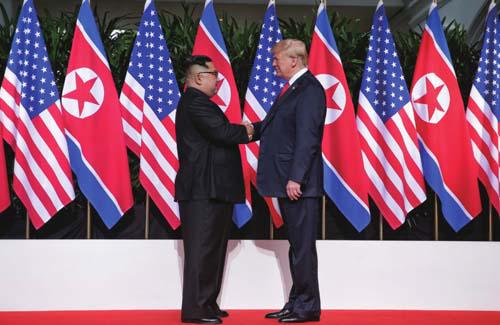An Icebreaking Meeting
2018-07-03ByShiYongming
By Shi Yongming

The much-anticipated meeting be- tween the leader of the Democratic Peoples Republic of Korea (DPRK) Kim Jong Un and U.S. President Donald Trump in Singapore on June 12 marked the first face-to-face contact between a sitting U.S. president and a DPRK leader. It signifi ed the beginning of the thawing of the antagonistic relationship between the two sides. However, from a cognitive point of view, the two parties are in the fi nal stage of a process preceded by years of gambling. Whether the process can be fi nished depends not only on the personal wisdom of the two leaders but also on the collective level of cognition of all parties involved.
Progress
In international relations, meetings between state leaders set the direction of their countries future relations. There are two approaches for conducting such meetings: problem-oriented and philosophical. The two are not mutually exclusive but there is always one approach that plays a dominant role. The former is adopted when dealing with routine affairs, while the latter is needed when it comes to major events. For instance, a philosophical approach was employed during the historic meeting between Chairman Mao Zedong and U.S. President Richard Nixon in 1972 because long-term, overarch- ing issues needed to be addressed first in order for Sino-U.S. relations to make substantial progress at that time.
Since the end of the Cold War, the United States has assumed global dominance. A new philosophical system underpinned by U.S. hegemony has been established. As a result, the United States uses a problem-oriented approach in talks with other countries and these dialogue partners have to choose whether to accept or reject the superpowers way of solving problems. This is one of the essential reasons for the predicament on the Korean Peninsula after the Cold War.
However, the U.S. stance changed slightly during the recent Kim-Trump meeting as it absorbed to a certain extent the DPRKs philosophy of dealing with international relations. Although the statement signed by the two leaders after the meeting is brief, it settled three issues concerning the future of the Korean Peninsula.
First, the DPRK and the United States committed to establishing new relations in accordance with the desire of the peoples of both countries for peace and prosperity. Second, the two nations agreed to join efforts to build a lasting and stable peace regime on the Korean Peninsula. Third, reaffirming the Panmunjom Declaration issued at the inter-Korean summit in April, the DPRK committed to working toward the complete denuclearization of the Korean Peninsula.
Although the document didnt elaborate on the relationship among the three issues, they obviously should be tackled as a whole since they underline the complexity of the deadlock on the Korean Peninsula. The United States must recognize this holistic connection. If it continues with a problemoriented mentality, nuclear issues on the peninsula will be more diffi cult to resolve.
Gaps
The wording of the Kim-Trump joint statement, nevertheless, revealed a gap in understanding of what denuclearization means. A major hurdle in previous talks regarding the Korean Peninsula nuclear issue stems from the two countries understanding of denuclearization. The DPRK wants denuclearization of the entire Korean Peninsula while the United States seeks the“complete, verifiable and irreversible” denuclearization of the DPRK alone. Moreover, the United States policy toward the DPRK in regard to nuclear weapons was completely left out of the picture.
In the late 1980s, when the United States began to bring up the issue of the DPRKs nuclear weapons, it was itself deploying tactical nuclear weapons to the Republic of Korea(ROK). In 1991, the United States withdrew these weapons in an effort to pressure the DPRK toward denuclearization. At the end of the year, the DPRK and the ROK signed the Joint Declaration on the Denuclearization of the Korean Peninsula.
Later, the United States tactically changed the wording from the “denuclearization of the Korean Peninsula” to the“denuclearization of the DPRK” in a bid to retain its right to use nuclear weapons against the DPRK and redeploy nuclear weapons to the ROK. The United States policy toward the DPRK is therefore a big obstacle to the denuclearization of the Korean Peninsula.
Can the United States adjust its policy in the future? Of course it can. The question is whether it wants to. Compared with previous U.S. presidents, Trump made some progress by announcing that the United States would withdraw troops from the ROK and stop conducting military exercises with the country, which the DPRK characterizes as war games.If a peace mechanism can be established on the peninsula, U.S. troops and nuclear weapons will be unnecessary.
However, if the Korean Peninsula becomes a nuclear-free zone, there will be restrictions on how close U.S. aircraft carriers, nuclear submarines and strategic bombers can get to the ROK, something warmongers in the United States will be reluctant to accept. Nevertheless, the United States needs to consider whether driving its strategic offensive weapons to other countries doorsteps is the only way for it to demonstrate its hegemonic status.
Building trust
The DPRK has often been blamed for failing to honor signed agreements in a Westerndominated international media environment. Western media and scholars ignore many facts. For instance, it was the United States that abandoned the Agreed Framework signed by the Bill Clinton administration and the DPRK in 1994 to freeze the latters nuclear program. The United States launched fi nancial sanctions on the DPRK in disregard of a joint statement reached by the sixparty talks involving the DPRK, the ROK, the United States, China, Russia and Japan on September 19, 2005. In addition, President Lee Myung Bak announced that the ROK would sever almost all trade with Pyongyang using the excuse of the human rights issue in 2010. Japan, for its part, also refused to cooperate in implementing relevant agreements by playing up “DPRK abductions of Japanese citizens.” This series of events has contributed to the conundrum concerning the denuclearization of the peninsula.
Agreements are only meaningful when they are reached through equal dialogue for realizing reasonable and fair goals. In future talks on Korean Peninsula issues, more attention must be paid to the goals behind the negotiations. Only when a constructive public opinion is formed will it be easier to solve the issues.
